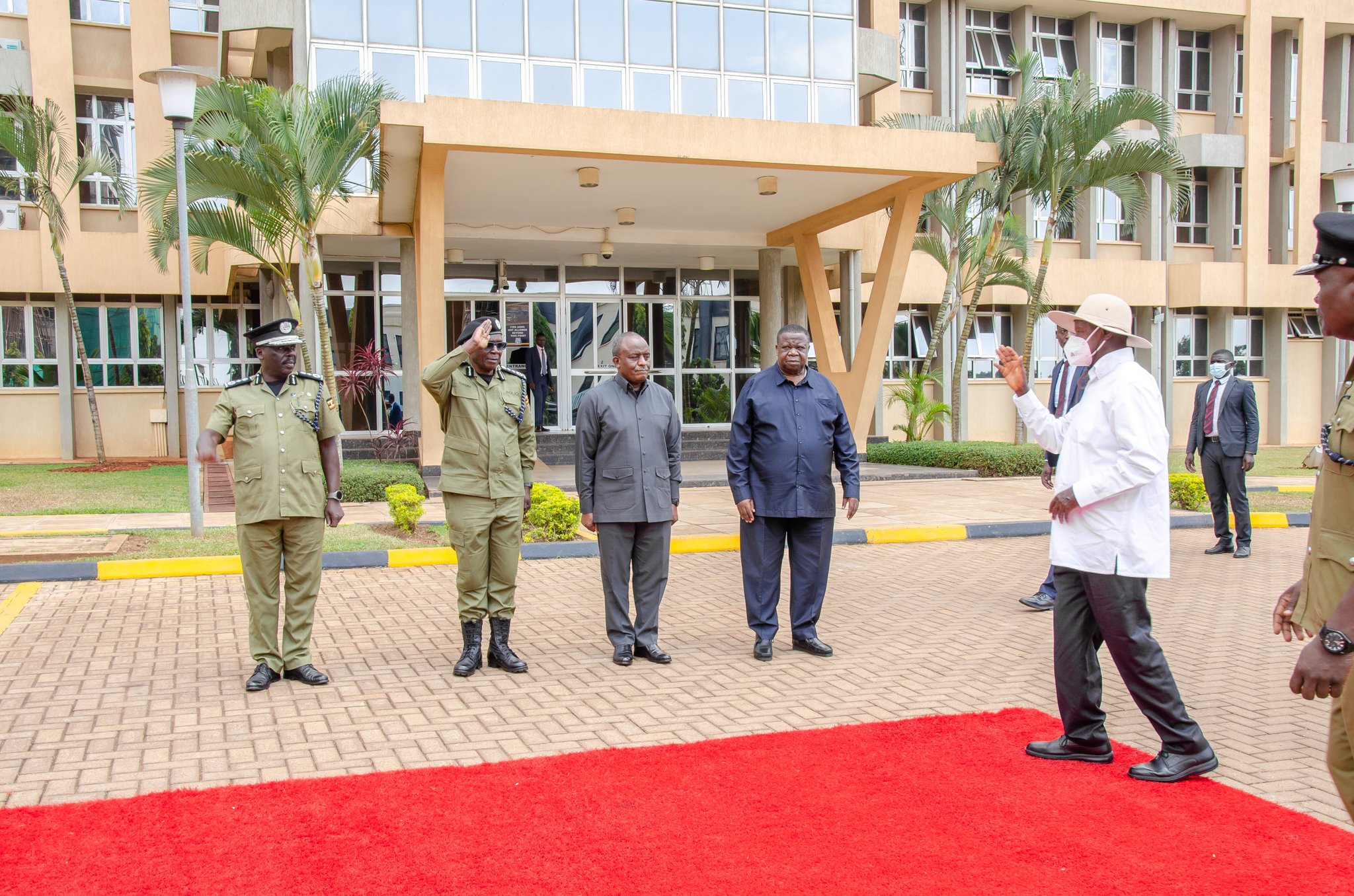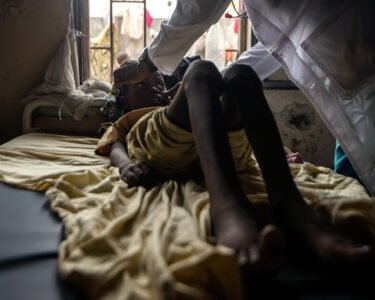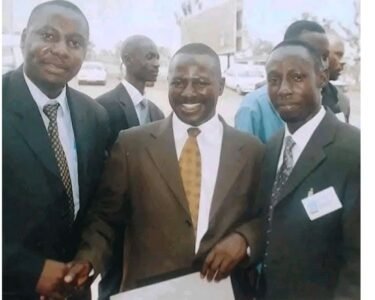President Yoweri Museveni has called on Uganda’s security agencies to place national security and stability above immediate welfare concerns, stressing the need for ideological clarity and strategic foresight.
He made the remarks during the opening of the 28th Police Council Meeting at the Police Headquarters in Naguru, Kampala. The meeting was held under the theme: “Strengthening Police Capacity to Address Contemporary Policing Challenges for a Safe and Secure Community.”
President Museveni underscored the security challenges facing many African nations, attributing their struggles to unrealistic planning.
“Many African countries fail because they plan as if they have unlimited resources. Security institutions—the army, police, intelligence services, and prisons—must operate within available means. The mistake others make is expecting all resources in place before ensuring security,” he said.
Reflecting on Uganda’s history, the president recalled how the National Resistance Army (NRA) operated for 17 years without salaries.
“When we launched our struggle in 1971 under FRONASA, we were volunteers. Our focus was saving the country, not earning a salary. That’s how we liberated Uganda. Had we insisted on pay, we would have been paralyzed,” Museveni stated.
He acknowledged the crucial support Uganda received from leaders such as Mwalimu Julius Nyerere of Tanzania and Samora Machel of Mozambique.
“Nyerere provided us training grounds, and Samora Machel did the same. Between 1976 and 1978, I trained 28 fighters. By the time Amin’s regime collapsed, we had built a 9,000-strong army, mostly armed by Tanzania, and later returned all the weapons,” he noted.
Museveni reiterated that Uganda’s success stemmed from prioritizing security over welfare.
“Even in Somalia, we have been there for 17 years. If our army’s existence depended on salaries, we wouldn’t have lasted. First, we stabilize the country; then, we generate resources for welfare,” he explained.
He also reaffirmed the National Resistance Movement’s (NRM) ideological stance against tribalism and sectarianism, emphasizing that Uganda’s prosperity hinges on national unity.
“Some people promote tribal divisions, unaware they hurt their own groups. For instance, Banyankole cattle keepers rely on Uganda to market their milk and beef. Without national unity, they would struggle,” he noted.
The president further highlighted the significance of regional and international markets for economic growth.
“By 1870, Germany consisted of 39 independent states; Italy only unified in 1860. As capitalism expanded, they realized economic integration was essential. Likewise, Uganda must access regional and global markets,” he said.
Museveni advised the police and army to adopt cost-effective welfare strategies, particularly in housing.
“Instead of hiring contractors who inflate costs, security forces should construct institutional housing. Living in barracks saves money and enhances coordination,” he suggested.
He also urged security agencies to establish self-sustaining initiatives.
“The police should set up health centers to lower medical costs and explore educational opportunities within army schools. Officers’ spouses should engage in income-generating activities within barracks,” he advised.
Additionally, Museveni encouraged security agencies to embrace modern technology for efficiency.
“In developed countries, officers don’t stand on roads; they monitor surveillance from command centers. Forensic analysis, canine units, and CCTV cameras are force multipliers that enhance security,” he said.
Reflecting on Uganda’s military development, the president noted that the Uganda People’s Defence Forces (UPDF) was built with limited resources.
“For 54 years, we had either no pay or low pay, yet we built a formidable army. That is why I prioritize scientists—when I’m sick, I need a doctor, not a literature scholar. We must first support those who save lives and stabilize the country, then address other needs,” he said.
Otafiire Cautions Against Security Abuse
Minister for Internal Affairs, Maj. Gen. Kahinda Otafiire, warned security personnel against abusing their authority, emphasizing that no one is above the law.
“Nobody is above the law,” Gen. Otafiire stated, condemning past instances of officers misusing their positions to oppress the public.
“They were meant to protect citizens but instead shielded wrongdoers. If you had a land dispute, certain individuals used their ranks to intimidate you. If you had a beautiful wife, some went to extreme lengths, even resorting to violence. If you owned a nice car, your life was at risk,” he revealed.
He assured the public that such impunity will no longer be tolerated.
“I have agreed with the Inspector General of Police that this mindset must end in the force,” he said.
Otafiire emphasized the sanctity of human life, reminding officers that even the president exercises restraint in capital punishment decisions.
“The right to take life is sacred. Even the president only signs a death warrant after receiving counsel from the Prerogative of Mercy Committee. Life should never be taken lightly,” he warned.
IGP Highlights Police Achievements and Challenges
Inspector General of Police (IGP) Abas Byakagaba welcomed the president to the council meeting, outlining key achievements, ongoing reforms, and challenges within the Uganda Police Force.
He noted that since the last Police Council Meeting in November 2019, the force has expanded its presence, improved crime response, and adopted modern policing technologies.
“In line with your excellency’s guidance, we have enhanced our coverage to ensure a quicker response to crime. We have deployed 13 police regions across 79 districts and 279 sub-counties to bring services closer to the people,” he stated.
Byakagaba highlighted strategic priorities, including security for upcoming elections, crime detection, professional development, and improved officer welfare.
“Our focus includes strengthening crime detection, enhancing officer professionalism, and improving housing, career growth, and community policing,” he added.
He further revealed plans to enhance anti-crime infrastructure, ICT capabilities, and logistical efficiency.
“We are prioritizing improvements to the CCTV surveillance system to ensure full functionality. Additionally, we plan to recruit 12,000 professional police constables in the 2024/25 financial year to strengthen security,” he stated.
Despite challenges such as manpower shortages and funding gaps, the IGP expressed confidence that continued government support would address these issues.
Byakagaba commended the collaboration between security agencies, including the UPDF and intelligence services, in maintaining law and order.
“Our crime report shows a 4.1% reduction in crime, reflecting our joint efforts to secure the country. I also appreciate our line minister for the leadership and support that has enabled us to focus on our priorities,” he said.
The IGP acknowledged the government’s move to increase police officers’ salaries in the current financial year, noting that it would boost morale and professionalism within the force.
Also in attendance were the Permanent Secretary of Internal Affairs, Lt. Gen. Joseph Musanyufu, and members of the Police Council.





